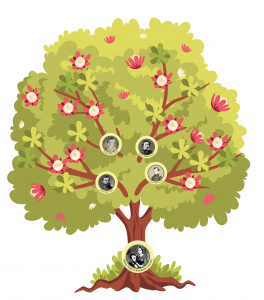Abraham Lincoln: Biography, Achievements and Family Tree
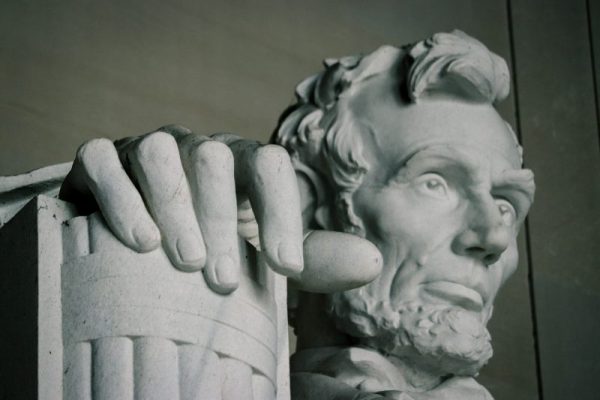
Abraham Lincoln – “Honest Abe” And “Great Emancipator”
The magnitude of Abraham Lincoln’s personality and impact on USA history is hard to overestimate. His blunt and to-the-point statements and policies earned him the nickname “Honest Abe”, while his other famous moniker, “The Great Emancipator”, was a result of his major contributions to freeing millions of African American people. In this article, we’re looking into the famous Kentucky native’s main achievements, as well as how he spent his formative years, his early political career and his family.
Early Life
Abraham Lincoln’s early life was far from an easy one. The sixteenth President of the United States, was born close to Hodgenville, Kentucky, on February 12th, 1809. He was raised on the edge of the frontier until his family relocated to Indiana when he was seven years old. He had very little formal schooling, but when he wasn’t helping out on his father’s farm, he read obsessively. So much so that a childhood buddy recalled Lincoln’s “manic” intellect and the image of him reading late into the night with red eyes and disheveled hair.
His first trip to a big city was in 1828 when he was nineteen years old and traveled with a flatboat loaded with vegetables down the Mississippi River to New Orleans, Louisiana. This trip is also connected to one of many curious facts about Abraham Lincoln – he decided to come back home on foot and did so, having traveled a very long distance. Two years later, Lincoln’s father relocated the family to Illinois in an effort to avoid financial and health issues.
Politics
When Lincoln initially entered politics, Andrew Jackson was in office. Lincoln agreed with the Jacksonians’ compassion for the common man, but he rejected their belief that the government should be separated from business. Lincoln was an avid proponent of Henry Clay and Daniel Webster’s views in that he argued in favor of using the federal government’s authority to create a national bank, a protective tariff, and a program of internal transportation improvements to promote trade and develop the nation’s resources.Unsurprisingly, he soon joined Clay and Webster’s political party, the Whigs.
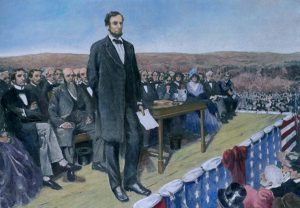
From 1834 to 1840, Lincoln served in the Illinois State Legislature, where he was elected four times. During that period, he worked tirelessly on an ambitious plan to use state money to build a network of roadways, railroads, and canals. Later, during his tenure in Congress (1847–49), he proposed a bill that would have allowed for the gradual and compensated emancipation of slaves in the District of Columbia, but because it was only to be implemented with the consent of the district’s “free white citizens,” it angered both abolitionists and slaveholders and was never given serious consideration. Suffice to say that Lincoln was never a pure abolitionist, contrary to popular belief – while he did value personal freedom very highly, his stance on slavery wasn’t strongly negative and unflinching.
Later in his political career, Lincoln started dedicating a lot of his time to his senate and presidential campaigns. In 1858, Lincoln ran against the sitting senator Stephen A. Douglas for the Senate seat, and it was reported that the debates they had were political oratory of the highest level. Lincoln and Douglas were not as far apart in their opinions – neither advocated for or against slavery. In the end, Douglas defeated Lincoln in the election, however the latter only built on the experience he gained during his run for senator. Very soon after, he was touted as a strong potential candidate for the 1860 presidency – and those were the elections that he did end up winning.
Great Achievements
Abraham Lincoln’s finest hour came with his presidency, when he was forced to make critical decisions in the most difficult of circumstances. Following Lincoln’s election, South Carolina declared its exit from the Union and, later, six additional states joined forces to form the Confederate States of America. Thus, a disunion crisis was upon the nation even before Lincoln took up residence in the White House.
Lincoln’s primary objective was always to keep the Union intact, and he conceded that a civil war may be necessary to make that happen, and so it did. Lincoln wasn’t lacking in morals; rather, he was a pragmatic, adaptable, and nimble-minded man who was willing to try different courses of action if one decision or another didn’t work out as planned. His famous quote, “my policy is to have no policy.” only highlighted that approach.
And as the Civil War was rampant, Honest Abe made a historic decision that would both help end the war and abolish slavery – he issued the famous Emancipation Proclamation on January 1, 1863. According to the proclamation, all slaves in the rebelling Confederate states would be free men if the Union were to be restored. The effect was massive as almost 180,000 of African Americans enlisted to fight on the side of the Union, which would be a catalyst for Union’s ultimate victory in the war and the country’s salvation.
National Freedom Day
Interestingly enough, there is a misconception that National Freedom Day has something to do with Abraham Lincoln’s birthday. But the reality is that National Freedom day commemorates the day when Lincoln signed the 13th Amendment to the Constitution, in 1865. It expanded Lincoln’s 1863 Emancipation Proclamation, which only applied to slaves residing in rebellious states (it did not consider enslaved people living in Union slave states such as Maryland, Delaware, Missouri, and Kentucky). The Emancipation Proclamation was also vulnerable to court review and potentially reversible before it was given support by the Constitution – that is another reason why the 13th Amendment was so important.
Family
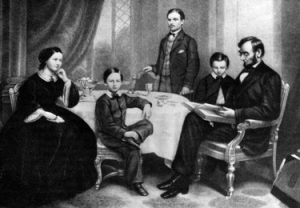
Abraham Lincoln’s family life had very high highs and very low lows. As we know from some of the correspondence that survived to this day, the Lincolns, at their peak, were a very happy couple. They shared a strong interest in the wellbeing of their sons, enjoyed one another’s company, and badly missed one another while they were apart. However, a number of personal tragedies, including many family deaths, brought a lot of pain and misery to the Lincoln household.
Wife
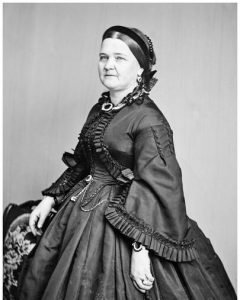
Abraham Lincoln’s wife was Mary Todd, his first and only true love. Todd was vivacious, astute, and educated, coming from a well-off Kentucky family and practically belonging to the country’s social elite. Some of her relatives disapproved of her friendship with Lincoln, and he himself occasionally had second thoughts about whether he could ever truly make her happy. Their engagement was even reportedly broken on his initiative on the first day of 1841 that Lincoln remembered as the “terrible first of January.” Thereafter, Lincoln suffered from severe depression, but luckily, the couple did manage to reconcile and got married on November 4, 1842.
Over the course of the next couple of decades, Abraham Lincoln’s wife’s life would take a tragic turn. She would acquire an obsession with spending money, amassing mammoth debt, and having experienced the shock of witnessing her husband’s murder, she would be diagnosed as clinically insane in 1875.
Kids
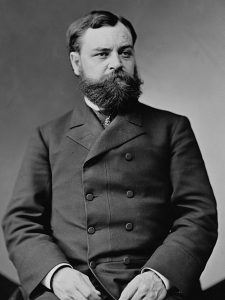
The Lincolns welcomed four boys into the world, however, tragically, only one of them, Robert Todd lived to adulthood. Edward Baker was just under 4 at the time of his death, William Wallace (“Willie”) was 11, when he passed, and Abraham’s favorite son Thomas (“Tad”), born with a cleft palate and a lisp, despite eventually outliving his father, still died very young. Being a very busy politician, Lincoln often left the upbringing of his children in the hands of their mother, who, according to various accounts, masterfully alternated between being lenient and strict in her treatment of them.
Conclusion
Abraham Lincoln is undoubtedly one of the most important people in American history, preserving the integrity of the country and changing millions of lives for the better. And how could we summarize his own life? A difficult childhood, an illustrious political career, a family life filled with both joy and sorrow, and a tragic end – that’s Abraham Lincoln’s history in a nutshell, and one that should never be forgotten.
You can see more famous family trees at Treemily.com so you will have an easier time catching up with stories and families woven into our culture.
